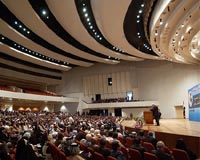 |
Baghdad (UPI) Sep 30, 2010 The return of Iranian-backed Shiite "Special Groups" who were behind much of the killing in Iraq in 2005-08 has thrust one of Tehran's most notorious warlords, Abu Mustafa al-Sheibani, back into the limelight. His outfit, known as the Sheibani Network, and another called Asaib al-Haq, or League of the Righteous, was responsible for some of the worst sectarian bloodshed in Iraq. U.S. and Iraqi officials say these groups have been reactivated by Tehran to stir up trouble as American forces withdraw nearly eight years after invading Iraq. It's a measure of Tehran's anxiety that moderate forces might triumph in Iraq that it has unleashed these killer groups again. The emerging surge in operations by these and other Shiite groups armed, funded and trained by the al-Quds Force, the elite clandestine arm of Iran's Islamic Revolutionary Guards Corps, appears to be part of Tehran's effort to ensure that a Shiite-dominated, Iran-leaning government is installed in Iraq. The country has been without a functioning government since parliamentary election March 7 ended with no clear winner. The Iranians want the current prime minister, Nouri al-Maliki, a Shiite and longtime ally of Tehran, to come out on top. He's reportedly opposed to Iran's religion-based political system but maintained good relations with Iranian leaders while he has been prime minister. He faces a major challenge from his leading rival, former Prime Minister Iyad Allawi. He is also a Shiite but was for years allied with the CIA. His political coalition al-Iraqiya is strongly backed by the minority Sunnis and he's the last Iraqi leader Tehran wants to see in power in Baghdad. In the spring of 2006, as the U.S.-backed Iraqi government was taking shape, Quds Force, commanded by Brig. Gen. Qassem Suleimani, launched a major offensive using the Special Groups drawn from established Shiite militias. The objective was to impose Tehran's will and ensure that Iraq could never again challenge Iran as Saddam Hussein had done since the 1970s, even before the 1979 Islamic revolution that toppled the Iranian monarchy. Suleimani's influence inside Iraq is immense since he can escalate the bloodletting any time he deems it necessary to secure Tehran's dominance of its historical enemy. Sheibani was originally a militia chieftain with the Iranian-backed Badr Organization, one of several Shiite movements that flourished in Iraq after Saddam Hussein was toppled. Badr was formed in Iran during the 1980-88 war with Iraq and comprised mainly captured Iraqi Shiite soldiers who detested Saddam's repressive rule. Even before the U.S. invasion in March 2003, Tehran ordered the Badr forces and other Iraqi Shiite exile groups, along with Iranian intelligence officers, to swarm into Iraq to fill the vacuum left by Saddam's doomed regime. According to one estimate, these forces totaled 12,000 armed men. When Iran wanted to intensify pressure on the Americans the Quds Force created the Sheibani Network and other Shiite groups to cause chaos. The Sheibani Network operated mainly in Baghdad and Shiite-dominated southern Iraq. His group was modeled on Lebanon's Hezbollah, Iran's main Shiite proxy in the Levant and now the most powerful single group in Lebanon. Indeed, U.S. and Iraqi officials say Hezbollah sent some of its top guerrilla warfare experts to Iran in 2006-08 to aid al-Sheibani and others. One was Ali Mussa Daqduq, a veteran Hezbollah commander. He belonged to Department 2800, a unit established to support the Quds Force training program. Daqduq was also reportedly chief adviser to Asaib al-Haq, then headed by Qais al-Khazali, another militia chieftain recruited by Tehran. He specialized in attacking U.S. targets. Daqduq was captured in the southern city of Basra along with al-Khazali and his brother Laith in March 2007. They were wanted for killing five U.S. soldiers in an attack on a U.S. command center in the holy city of Karbala. Sheibani's fighters carried out similar attacks and introduced advanced roadside bombs developed by Hezbollah against the Israelis. These caused large numbers of U.S. and coalition casualties. His outfit also ran an arms smuggling operation that provided the Iranian-backed groups with weapons and explosives. By 2006 Sheibani was on Baghdad's most-wanted list. He later dropped out of sight and holed up in Tehran until his group was reactivated.
Share This Article With Planet Earth
Related Links Iraq: The first technology war of the 21st century
 Lack of Iraq govt hurting security and refugee returns
Lack of Iraq govt hurting security and refugee returnsBaghdad (AFP) Sept 29, 2010 A spike in unrest accompanying Iraq's failure to form a government is scaring people from passing on much-needed intelligence and deterring refugees from returning home, a general and diplomats said Wednesday. The remarks from the commander in charge of US troops in Baghdad and UN officials were the latest sign that the current stalemate, which has seen no new government formed since electio ... read more |
|
| The content herein, unless otherwise known to be public domain, are Copyright 1995-2010 - SpaceDaily. AFP and UPI Wire Stories are copyright Agence France-Presse and United Press International. ESA Portal Reports are copyright European Space Agency. All NASA sourced material is public domain. Additional copyrights may apply in whole or part to other bona fide parties. Advertising does not imply endorsement,agreement or approval of any opinions, statements or information provided by SpaceDaily on any Web page published or hosted by SpaceDaily. Privacy Statement |